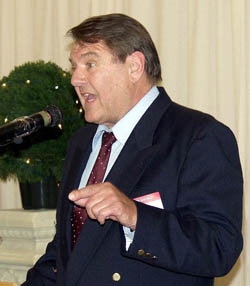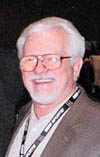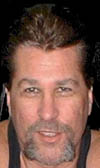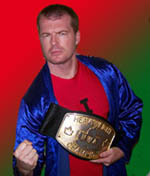WINNIPEG — Promoters have added their voices to the indy wrestling veterans who have taken umbrage at rookies wrestling for very little or nothing. While many differed on whether to use some or no cheap talent at all, most were consistent in pointing fingers at one another for contributing to this growing problem in the industry.
“There’s a whole bunch of wannabes wrestling for nothing and it’s not helping guys who’ve been around for years,” said Emile Dupre, owner of Canadian East Coast mainstay Atlantic Grand Prix Wrestling. He added he always ran towns where everybody got paid. “It’s a joke to some of these people. They just want to wrestle for nothing.”

Emile Dupre in the summer of 2006. Photo by Bob Leonard
Jason Deadrich, a booker with California’s All Pro Wrestling and ChickFight TV, said he appreciated good talent and always paid well for it.
“APW gets their wrestlers booked on shows when they are ready,” said Deadrich. “The bigger problem is too many untrained wrestlers are out trying to get work. These guys need to get into a school and learn and when it is time, they will get work.”
Promoters using mostly free talent should be prepared for a weak show, Deadrich said.
“Obviously, it goes without saying that you get what you pay for,” Deadrich said.
“My feelings are that everyone on a card should be paid, and paid the unofficial biz minimum of $50, going up from there based on name, quality and experience,” said promoter Pete Smith of British Columbia’s Extreme Canadian Championship Wrestling, who also works as “Rocket” Randy Tyler.
Jian Magen of Ontario’s Twin Wrestling Entertainment said he did not see a problem with using cheap talent “as long as there is room on the card.”
“In the indy world the fans are usually coming to see the headliner, so if you throw out some rookie workers who are going to give 100% then you create balance,” Magen said. “Whether they are green or not, you can see their desire to become successful. This is how they all got started. If a vet is upset about it he should lower his rate or call the promoters himself. Don’t work for free just let people know you’re available. A lot of these same workers did the same thing to get to where they are.”

Les Thatcher
Les Thatcher, who began wrestling in 1960 for a small promotion in Boston, said as a trainer he expected his students to wrestle for free on his shows as part of their training. If he brought in outside talent then those wrestlers were paid according to a set price, he said.
“I don’t believe that it is harmful for the kids to wrestle for free up to a point, like for their trainers, but too often the guys offering their services for nothing are worth exactly that, and do nothing to elevate a show,” Thatcher said.
RIVALS TO BLAME
Many promoters blamed their rivals for ruining the business, especially when it came to using mostly cheap talent to put on shows.
“Sadly, at least around this part of the country (Ohio), there are so many hobby feds that use unskilled workers they often don‘t draw enough to pay the rent,” said Thatcher. “I think in this day and age the thing is that just to keep from filing bankruptcy the part-time promoter or hobbyists will take the cheapest way out. We must realize that the structure of the business has changed so drastically this has become the norm, good or bad.”
The blame should not fall on the guys offering to work for free (as anyone trying to break into show business tries that), but rather on promoters that allow them to do so, Smith said. If a promoter cannot afford to pay a full roster of eight to 12 wrestlers, he should not be running a show.
“Related to that, if you don’t feel a wrestler is worth $50, you should not be putting him on. This is the traditional formula that, years ago, kept indy wrestling shows to a certain minimum standard,” said Smith.
“It disappoints and frustrates me when I see other promotions in our market put on less than quality shows because they either can’t or won’t pay market value for the best workers when they can use less talented guys cheaper or for free,” said Winnipeg’s Premier Championship Wrestling director Andrew Shallcross.
He said he could save half his payroll every show if he decided to only use a couple of veterans and fill out the rest of the card with less talented wrestlers, but added he would rather not run a show than do that.
“Another issue in this debate is that some promoters have trouble attracting the best talent, at least in our market, due to personality conflicts with the boys or their primary promoter or the lack of quality of their promotion. Regardless of pay, some workers simply don’t want to work for certain promoters or promotions,” Shallcross said.

Ernie Todd
Ernie Todd, owner of Winnipeg’s Canadian Wrestling Federation, said he has never felt forced to use talent that offered their services for nothing or next to it. No longer running shows in Winnipeg, he pointed out he pays everyone during out-of-town tours, but added he takes a limited crew size to accommodate his budget for wrestler payouts.
“In this day and age, indies are struggling. They start up one day, burn a venue, then are gone the next,” said Todd, who admitted losing count of the number of promotions in Winnipeg but estimated the number at seven or eight. That high number has spread the talent pool too thin and dropped the audience levels of those promotions to as low as 20 people a show, Todd said.
“Most promoters and wrestlers have full-time jobs, as that is the only way they can survive. There are very few like myself who make their living doing this. It is a tough business to make money in,” said Todd. “When I promoted regular in Winnipeg back in 1998 to 2001, the CWF drew 300 to 500 fans on a monthly basis at its regular monthly venue.
“The wrestlers sold tickets, put up posters, I bought radio advertising, I got 10 sponsors a show and everyone was happy. I also ran other venues that broke even and got bought shows in Winnipeg. When other promoters started cutting the prices, offering my bought show customers to run off the gate, charged less money for ticket prices, used whatever means, fair or unfair business practices, to try to run me out of the business, the whole business here in Winnipeg went into the toilet. Now promoters are losing money, which is why I don’t bother running shows in Winnipeg.”
The inability to make money have forced other promotions to use untrained workers, according to Todd.
“One promoter here thrives on putting untrained and undertrained people in the ring. Let’s face it, if you are getting less than $100 at the gate or guarantees of $150 and you boast a 20-man crew, someone is not getting paid or they are all working for $5 or $10. When you are not forced to operate as a business, this happens. I have heard from other promoters that some wrestlers actually paid to be on shows. A year or so ago a bunch of local wrestlers paid $25 to be in a Battle Royal. What does that tell you?”
Alberta’s Real Canadian Wrestling has been criticized for once having a show in which audience members “wrestled” in a battle royal.
“When I first started RCW, I used people who were not trained and were willing to work for free. I don’t support this practice at all any more and I think if a worker is willing to work for free then he is has no faith in himself or his training,” said booker Steven Ewaschuk.
Ewaschuk complained about rival promotions exacerbating the problem.
“There is always some new guys walking into the business and calling themselves a wrestler but it’s because there are promotions such as the Alberta Wrestling Federation and XWE here in Alberta who will use anyone who owns a pair of knee pads and will sell five tickets to their friends and family,” Ewaschuk said.
Alberta Wrestling Federation owner Perry Delbridge — without naming names — said “backyard promoters” who use only rookies so they do not have to pay anything should get out of the business.
“You’ve got to put on quality shows with quality wrestlers. But a lot of people go in there to make a fast buck,” Delbridge said.
Some promoters use the excuse that they only draw 30 to 40 people and therefore cannot afford to hire veteran performers, Delbridge claimed. But then he cited a promotion like the Prairie Wrestling Alliance in Edmonton that routinely pulls in 300 to 700 people per show to prove shows can draw if the wrestlers are well trained.
Delbridge said Calgary made a big mistake when it got rid of its wrestling commission, because now there is nothing to prevent anyone from putting on events. Producing bad shows burns a venue for future events because fans leave with a bitter taste in their mouths will never return.
“But until promoters can get on the same page and stop cutting each others’ throats, it’ll never happen,” Delbridge said, adding personal feuds between promoters are also hurting the business. “(Circumstances would improve) if promoters would not play the exclusive card, where a promoter won’t use a guy if he’s working for another guy. The more in-ring training he gets, the better he’s going to be.”
Delbridge felt TNA had the right idea, allowing stars like Samoa Joe to wrestle for small indy venues in different cities. Fans who see him but never watched TNA before might tune in next time, thereby boosting the show’s audience.
TRAINERS GUILTY TOO
Dupre complained there is no longer a weeding out process and the result is people rushing to the ring to copy moves they saw on TV. He felt the days of long-time pros picking out guys who they thought had the look, athleticism, and charisma to make it are long over.
“Now it makes no difference,” Dupre said, pointing out so-called wrestling schools run by guys with inadequate experience taking on all comers who can pay the fee, even when the trainee “has no chance in Hell he’ll make it. And that’s all over the country.”
“The business has changed so much, where you had to be 200, 220, 250 pounds, now you have middleweights, 140 pounds. It’s not the business it was 10, 15, 25 years ago. It’s like the weather it’s changed so much,” Dupre said.
“This is my eleventh year and I can tell you that it is getting worse and worse,” Todd said of a lack of respect in the business. “If someone is going to train people, then they better have a place for them to work. That is what I did when I ran a training centre. Then you can get a mix of paid vets and green guys. What happens is that some trainer takes some trainee’s money, has no place for them to work, then makes deals with a promoter they cannot refuse, thus cutting the prices of a more experienced wrestler who tries to make a living off this business. In the end it is the boys screwing the boys.”

Pete Smith as “Rocket” Randy Tyler
Smith said the veterans will have a lot to do with whether or not the “old-school minimum standard formula” is revived.
“At the end of the day, it will be up to the veterans, who are also normally the indy promoters these days, to take a stand and simply decide if they can’t run a show worth watching, they should not run a show at all. I honestly believe a return to the strict controls of old would, in time, yield huge benefits to indy communities all over the North America, and would make indy wrestling a better, more profitable and reputable business in general,” Smith said.
END OF AN ERA?
Dupre lamented the drastic transformation of the industry, especially the total outing of the business. Thanks to Vince McMahon Jr. throwing kayfabe out the window, the industry has been turned upside down.
“They killed the drama of wrestling.” Dupre said, adding what really grated his nerves is the Wrestling Reality documentary series airing this fall on The Fight Network that will follow wrestlers traveling through Atlantic Canada.
With 50 years of experience behind him, Dupre remembered a time when the business would have blackballed heels and babyfaces for merely drinking together in public. He did not mask his disgust at the series’ intention of revealing the boys carousing together after a show, and worse still, giving the audience total access to what was once the closed inner sanctum of the dressing room to reveal all the tricks of the trade. He seriously doubted the show would propel the participating wrestlers to greater heights.
“They think they’re really doing something. They’re not doing shit” but hurting the business, Dupre said.
He compared the series to magicians demonstrating how to perform their tricks before a show, or a loudmouth in a movie theatre constantly reminding everyone around him that “it’s all an act.”
“It ruins the whole thing.”
Dupre spoke of the glory days of Grand Prix when headliners Andre the Giant and Don Leo Jonathan sold out houses, and the years that followed when fans flocked to see stars like Randy Savage, Edge, and Christian Cage before they became mainstream players.
Dupre was so revolted by the current state of the wrestling industry that he admitted to having second thoughts about even touring this summer.
“When I see what’s happening now I could almost puke. The new breed is nothing like it used to be,” Dupre said.
RELATED LINKS
- Elite Pro Wrestling Training website
- Les Thatcher on Twitter
- www.allprowrestling.com
- www.chickfight.tv
- www.twinwrestlingentertainment.com
- www.lesthatcher.com
- www.eccw.com
- www.PCWaction.com
- www.cwfwrestling.com
- www.realcanadianwrestling.com
- www.albertawrestling.tk

